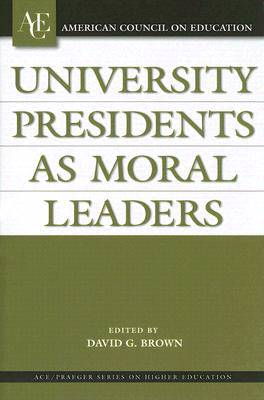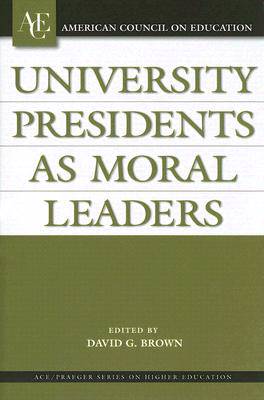
- Retrait gratuit dans votre magasin Club
- 7.000.000 titres dans notre catalogue
- Payer en toute sécurité
- Toujours un magasin près de chez vous
- Retrait gratuit dans votre magasin Club
- 7.000.0000 titres dans notre catalogue
- Payer en toute sécurité
- Toujours un magasin près de chez vous
Description
How university presidents lead is an extremely important topic, for both the welfare of universities and for society and for society as a whole. This book is based on papers presented at Wake Forest University, where three forums co-sponsored by the Center for Creative Leadership were held to address the questions of leadership in American universities. This book is structured around nine of the papers that were presented. Each paper was authored by a university president; each discusses a specific issue that the president faced during his or her tenure; each concludes with lessons learned. Three other presidents were asked to reflect on the essays based on their own experiences. In the fall of 2003, the Center for Creative Leadership at Wake Forest University hosted three synopsia where leaders of 36 US universities and colleges reflected and debated about their roles and responsibilities. The 29 essays, many of them responses to others, explore such issues as leadership in time of crisis, the University of Michigan's affirmative action case, promoting high achievement among minority students, leadership and teaching, and the unique character of academe. For those in positions of academic leadership, University Presidents as Moral Leaders is an engaging and thought-provoking read about the role of university presidents. Leaders facing a crisis will find the reflections of these presidents useful. The value of the book is its candid discussion of presidential leadership from a first person point of view. The outstanding contributors to this book share their experiences about the kind of leadership situations senior administrators face and the moral decisions they are called upon to make. Among them are: Mary Sue Coleman, President, University of Michigan; Molly Corbet Broad, President, University of North Carolina System; William Kirwan, Chancellor, University of Maryland System; Edward S. Malloy, President, University of Notre Dame; Steve Sample, President, University of Southern California; Graha
Spécifications
Parties prenantes
- Auteur(s) :
- Editeur:
Contenu
- Nombre de pages :
- 268
- Langue:
- Anglais
- Collection :
Caractéristiques
- EAN:
- 9780275988142
- Date de parution :
- 30-11-05
- Format:
- Livre relié
- Format numérique:
- Genaaid
- Dimensions :
- 170 mm x 242 mm
- Poids :
- 557 g

Les avis
Nous publions uniquement les avis qui respectent les conditions requises. Consultez nos conditions pour les avis.






